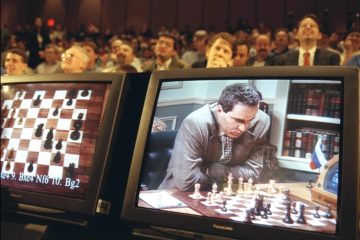Francisco Toro in Persuasion:
 It’s easy now to forget how shocking the moment was: just after 4pm on May 11th, 1997, Garry Kasparov resigned in the final game of his highly anticipated chess match against Deep Blue, an IBM supercomputer. A machine had beaten the human world chess champion in a competitive match for the first time. Commentators used to thinking of elite-level chess as a sort of irreducibly human area of excellence—the pinnacle of our species’ intellect—were forced into a moment of humility, reconsidering the topography at the outer limits of human and machine intelligence.
It’s easy now to forget how shocking the moment was: just after 4pm on May 11th, 1997, Garry Kasparov resigned in the final game of his highly anticipated chess match against Deep Blue, an IBM supercomputer. A machine had beaten the human world chess champion in a competitive match for the first time. Commentators used to thinking of elite-level chess as a sort of irreducibly human area of excellence—the pinnacle of our species’ intellect—were forced into a moment of humility, reconsidering the topography at the outer limits of human and machine intelligence.
Today, we’re experiencing a new moment of AI vertigo. For months now, commentators have been coming face-to-face with the shocking capabilities of a new generation of AI engines like OpenAI’s ChatGPT, and are walking away staggered, with a sickened certainty that something big is afoot, but only the haziest notion of where it might be leading. Historical parallels fail us, leaving us with a queasy sense that whatever might be about to hit us, we’re not ready.
Stepping into this haze to try to hazard a vision of the future is obviously fraught, but the moment of AI vertigo can’t last forever. As we acclimate to this weird new reality, we’re going to need mental models for what comes next. They won’t be perfect, of course. But they can cut through some of the fog, giving us at least a sense of what must change, and what won’t.
More here.
